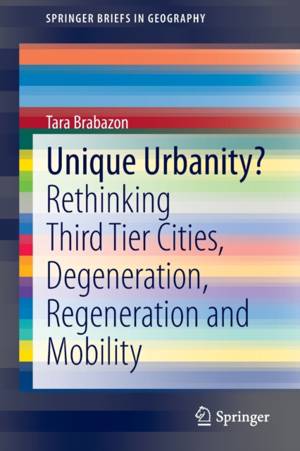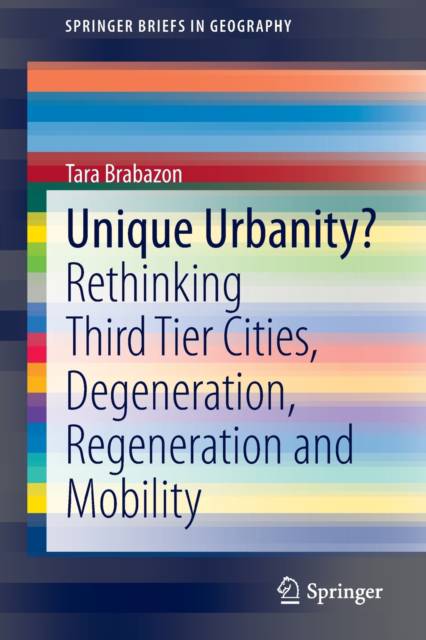
- Afhalen na 1 uur in een winkel met voorraad
- Gratis thuislevering in België vanaf € 30
- Ruim aanbod met 7 miljoen producten
- Afhalen na 1 uur in een winkel met voorraad
- Gratis thuislevering in België vanaf € 30
- Ruim aanbod met 7 miljoen producten
Zoeken
Unique Urbanity?
Rethinking Third Tier Cities, Degeneration, Regeneration and Mobility
Tara Brabazon
€ 69,95
+ 139 punten
Omschrijving
This book investigates small cities - cities and towns that are not well known or internationally branded, but are facing structural economic and social issues after the Global Financial Crisis. They need to invent, develop and manage new reasons for their existence. The strengths and opportunities are often underplayed when compared to larger cities. These small cities do not have the profile of New York, London, Tokyo or Cairo, or second-tier cities like San Francisco, Manchester, Osaka or Alexandria. This book traces the current state of the creative industries literature after the GFC, but with a specific focus. The specific - and worsening - conditions in third-tier cities are logged. The social and economic challenges within these regions are great, particularly with regard to health and health services, education, employment, social mobility and physical activity. This is not a study that merely diagnoses problems but raises strategies for third-tier cities to create both a profile and growth. The current research field is synthesized to reveal how cities are defined, constituted, developed and, in many cases, suffering decline. There is an imperative to build relationships with other urban environments. The book enters these under-discussed locations and reveal the scarred layering of injustice, signified by depopulation, dis-investment, economic decline and a reduction in public services for health, transportation and education, while also developing specific and innovative models for improvement. The vista summoned in Unique Urbanity is international, with strong attention to trans-local strategies that offer wide relevance, currency and opportunities for policy makers. While third-tier cities are often hidden, marginalized, invisible or demeaned, Unique Urbanity shows that innovation, imagination and creativity can emerge in small places.
Specificaties
Betrokkenen
- Auteur(s):
- Uitgeverij:
Inhoud
- Aantal bladzijden:
- 103
- Taal:
- Engels
- Reeks:
Eigenschappen
- Productcode (EAN):
- 9789812872685
- Verschijningsdatum:
- 5/12/2014
- Uitvoering:
- Paperback
- Formaat:
- Trade paperback (VS)
- Afmetingen:
- 156 mm x 234 mm
- Gewicht:
- 167 g

Alleen bij Standaard Boekhandel
+ 139 punten op je klantenkaart van Standaard Boekhandel
Beoordelingen
We publiceren alleen reviews die voldoen aan de voorwaarden voor reviews. Bekijk onze voorwaarden voor reviews.











